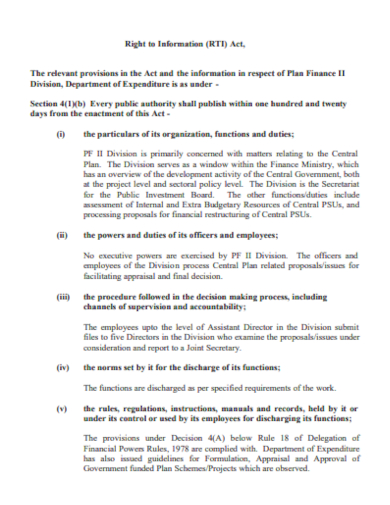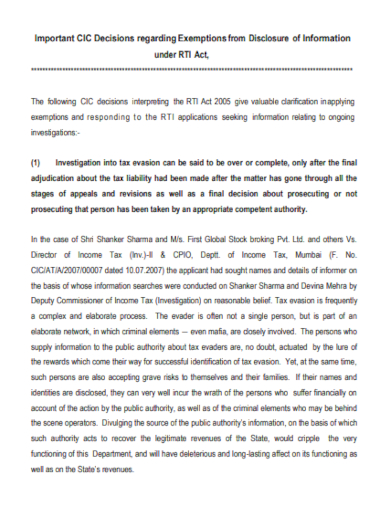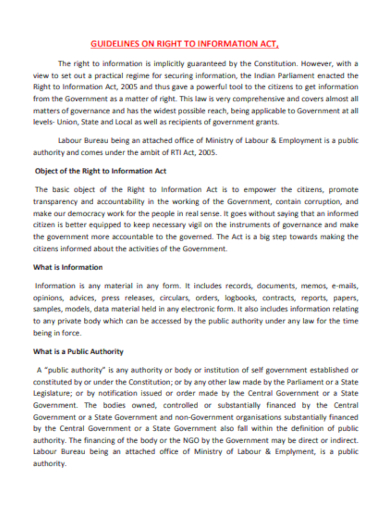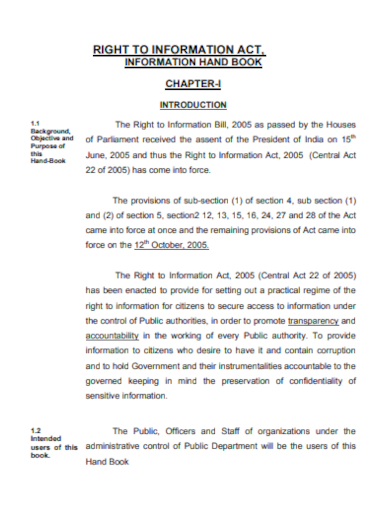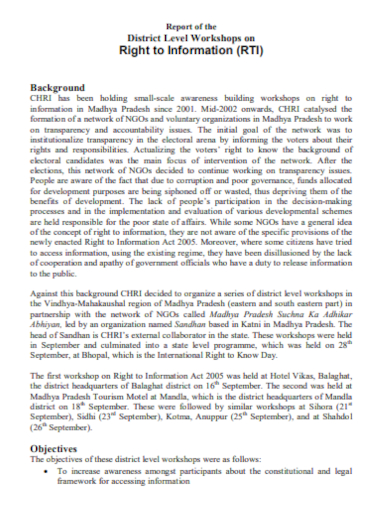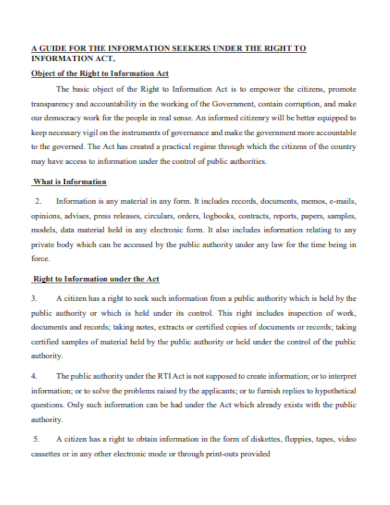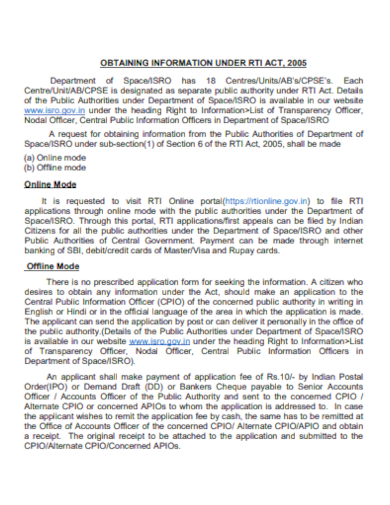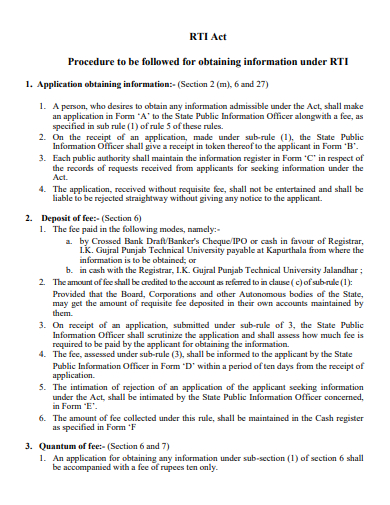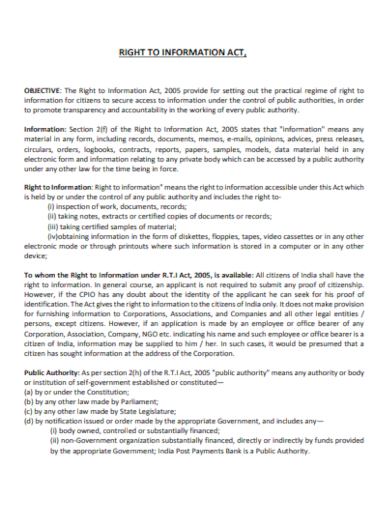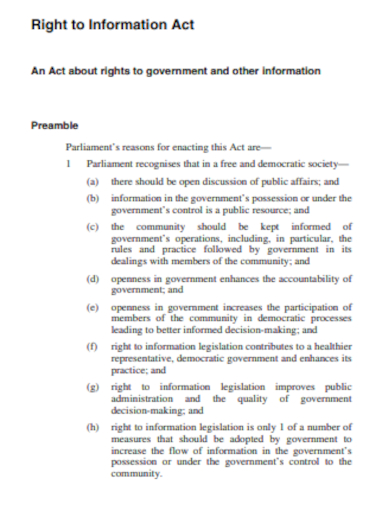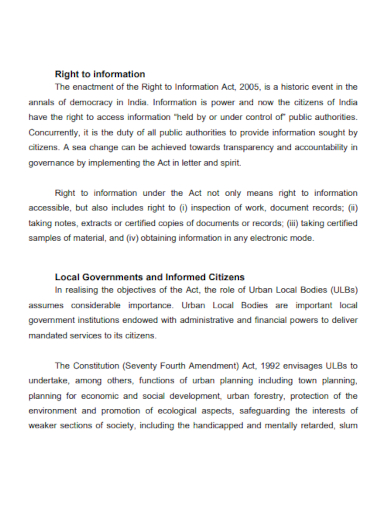The right to information is an important part of the democratic process, as it allows citizens to participate fully in the decisions that affect their lives and to hold their governments accountable for their actions. It also promotes transparency and good governance, as it allows people to see how public bodies are using their management resources and how they are making decisions that affect the public relations.
10+ Right To Information (RTI) Act Samples
1. Right To Information Act
2. Disclosure Right To Information Act
3. Right To Information Act Guidelines
4. Sample Right To Information Act
5. Report of Right To Information Act
6. Standard Right To Information Act
7. Online Right To Information Act
8. Right To Information Act Procedure
9. Authority Right To Information Act
10. Basic Right To Information Act
11. Formal Right To Information Act
What Is Right to Information Act Sample?
The right to information is a fundamental human right that is recognized in a number of international human rights instruments, including the International Covenant on Civil and Political Rights (ICCPR). It is the right of any individual to access information held by public bodies, and to have access to confidential information about oneself. The right to information is closely related to the right to freedom of expression, which is also protected by international human rights law.
How To Make a Right to Information Act?
In order to exercise their right to information, individuals may need to make a request for information to a public body. The public body is then required to respond to the request within a certain time block and to provide the information requested, unless there are specific exemptions in place that allow it to withhold the information. Besides, the body can start from scratch in crafting it or through the available pre-made templates online.
Step 1- Identify the Public Body
This could be a government department, a local council, or any other public body subject to freedom of information laws. Determine the process for making a freedom of information request in your country. This may involve filling out a specific form or writing a letter to the public body.
Step 2- State the Information Clearly
Be as specific as possible about what you are looking for, as this will help the public to locate the information more easily. Provide any necessary personal information. Some countries require you to provide personal data to make a freedom of information request.
Step 3- Submit Your Request
You can do this in person, by mail, or online, depending on the specific process in your country then wait for a response. The public body is required to respond to your request within a certain timeframe, which may vary depending on the complexity of the request and the volume of information involved.
Step 4- You can Appeal
If you are unsatisfied with the response, you may have the option to appeal the decision. This may involve going through an internal review process or seeking a review by an independent body.
Who has the right to information?
The right to information is a fundamental human right that belongs to all individuals. In many countries, freedom of information laws give people the right to request and access information held by public bodies.
What types of information can I request?
You can request any information that is held by a public body, unless there are specific exemptions in place that allow the public body to withhold the information. Exemptions may be put in place to protect the privacy of individuals, to protect national security, or to protect other important public interests.
How do I make a right to information request?
To make a right to information request, you will need to follow the specific process set out in the freedom of information laws of your country. This may involve filling out a specific form or writing a letter to the public body. You may be able to do this in person, by mail, or online, depending on the specific process in your country.
The right to information is often expressed as the right to access information held by public bodies, and to request information from them. In many countries, there are specific laws that give people the right to request and access information held by public bodies. These laws are known as freedom of information laws, or access to information laws.
Related Posts
Weekly Schedule Samples & Templates
Contractual Agreement Samples & Templates
FREE 9+ Amazing Sample Church Bulletin Templates in PSD | PDF
Sample Business Card Templates
Sample Cashier Job Descriptions
Questionnaire Samples
FREE 10+ Sample HR Resource Templates in PDF
FREE 10+ HR Consulting Business Plan Samples in MS Word | Google Docs | Pages | PDF
FREE 49+ Sample Job Descriptions in PDF | MS Word
FREE 16+ Nonprofit Budget Samples in PDF | MS Word | Excel | Google Docs | Google Sheets | Numbers | Pages
FREE 13+ Academic Calendar Templates in Google Docs | MS Word | Pages | PDF
FREE 10+ How to Create an Executive Summary Samples in Google Docs | MS Word | Pages | PDF
FREE 23+ Sample Event Calendar Templates in PDF | MS Word | Google Docs | Apple Pages
Company Profile Samples
FREE 10+ Leadership Report Samples [ Development, Training, Camp ]

